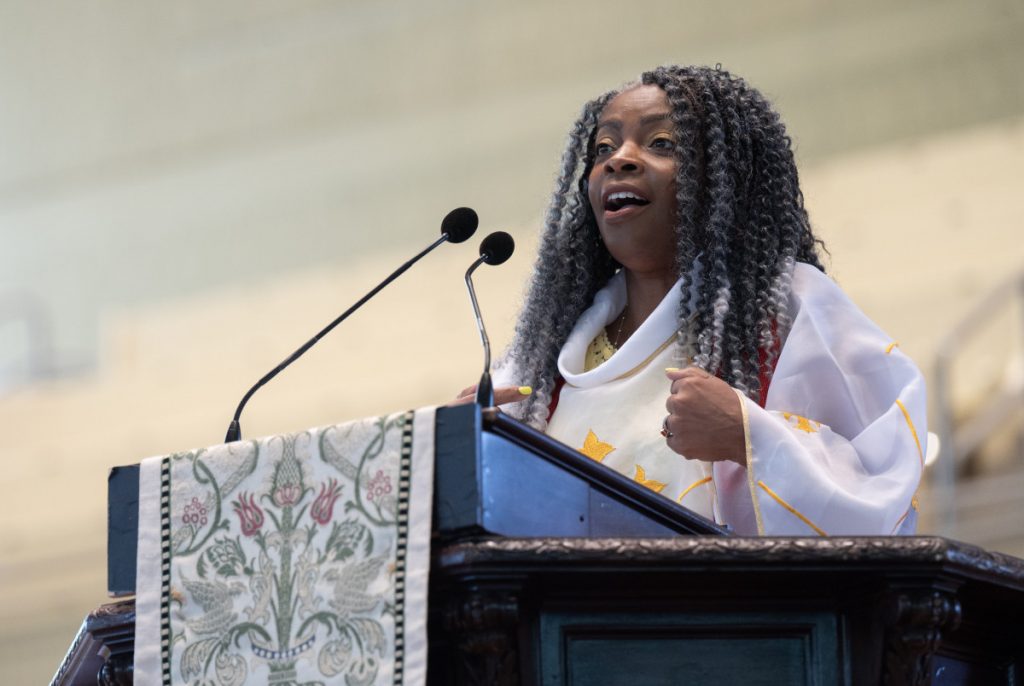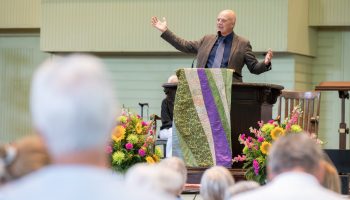
Bishop Cynthia Moore-Koikoi delivers her sermon “The Declaration of Independence: We are Free from Grandma’s Context” during the morning worship service.
Since Sunday, Bishop Cynthia Moore-Koikoi has been wearing a flowing, diaphanous robe to preach in, made by the Pious Disciples of the Divine Master in the Philippines. The sisters teach women how to make liturgical vestments to support themselves and their families.
“I am not wearing my robe today as an acknowledgment of God’s declaration of independence from the errors of our religion,” she said. “I am not speaking to you today as Bishop Cindy, but Pastor Cindy, a member of the United Methodist Church.”
The title of her sermon during Wednesday’s morning worship service in the Amphitheater was “Declaration of Independence: We are Free from the Errors of Our Religion,” and the scripture reading was Galatians 4: 21-31.
The United Methodist Conference of Western Pennsylvania recently met in Erie, Pennsylvania. The Conference partnered with the City of Erie to do some service work during the meeting.
The mayor greeted the Conference members and said, “I have a confession to make at this significant moment. I was raised Catholic and I was taught you were all going to hell.”
The Conference members laughed. The mayor asked Moore-Koikoi, “Why are they laughing so loudly?” She told him, “When they were growing up, they were taught that you were going to hell.”
“It was a moment of liberation for all of us,” she told the congregation. “It was a release from the sins of our respective denominations.”
Moore-Koikoi said all faiths have made statements about the errors of others, and they judge those errors more grievously than their own.
“Our flinging of insults and hurling judgment has damaged our own witness and has made it more difficult for our children to have anything to do with organized religion,” she said.
Moore-Koikoi is a fourth-generation Methodist and she went through a season of life wondering if she wanted to continue being one. She thought of the song with words by Johnson Oatman Jr., “Count your blessings.”
“When upon life’s billows you are tempest-tossed, / When you are discouraged, thinking all is lost, / Count your many blessings, name them one by one, / And it will surprise you what the Lord has done.”
Moore-Koikoi continued, “Cindy decided to count the many sins of my denomination to see what God would do. When I was born and baptized into the church, by church law I could not become a bishop. No Blacks could be in authority over whites.”
She listed several more sins. The Methodist church did not start ordaining women until the 1950s. The church stole land from Indigenous peoples and ministers took up arms and massacred Indigenous people. The United Methodist Church, for 50 years, labeled “some of God’s children as living in sin and ignored those who were sexually abused,” she said. “I could go on and on and on and on.”
Moore-Koikoi asked herself why she should remain in the United Methodist Church.
“I will answer that question, but first I have to offer an apology,” she said. “As clergy in the United Methodist Church, I apologize for the ways we have harmed you. I promise as we are made aware of the harm, we will try to work to repair the harm, and try to move as perfected in love as a denomination so we don’t do harm to anyone in the name of the church.”
Next, she offered an ecumenical apology to the Catholic Church for the way she and Methodists judged Catholics as beyond redemption.
To Muslim siblings, she offered an apology for the way the church had taken possession of the story of Hagar and Sarah and used it to do harm. To Jewish siblings, she apologized for taking the words of Paul and using them to inflict harm on Jews.
Moore-Koikoi also apologized to Muslim siblings for generalizing particular radical actions, and not doing the same for some Christians.
“We have not generalized as radicals some who call themselves Christian, like the KKK and the Proud Boys, who don’t stand for us,” she said, “but we generalize Hamas as standing for all of you.”
After counting the many sins of the church, Moore-Koikoi talked with God. “I was convicted, confronted and comforted,” she said. “God said there was no perfect denomination and I would not know if it was perfect because I am not a perfect judge.”
She continued, “The United Methodist Church, in its imperfection, helped to perfect me in love so I can reflect more of God in the world. God asked, ‘Do you believe in the power of the cross and the grace that comes with it?’ If you do, that is sufficient – even for the United Methodist Church.”
To believe in the power of the cross and to reflect on the grace that comes with it can work to bring in the “kindom” of God, the shalom of God, even if humans are imperfect.
On Sunday after the morning service, Moore-Koikoi met with the young adults who are part of Chautauqua’s Abrahamic Program for Young Adults. From Christian, Jewish, Muslim and Abrahamic Buddist backgrounds, they are at Chautauqua to foster intentional interfaith dialogue.
“They have been liberated from errors to learn about God, and I knew something more about who God is from them,” she said. “This is my journey of liberation from the United Methodist Church.”
The Rev. John Morgan, pastor of the Williamsburg, Virginia, Presbyterian Church, presided. The Rev. Rachel Stuart, the new pastor of Hurlbut Memorial Community United Methodist Church, read the scripture. The prelude was “Prélude,” from Prélude, Fugue, et Variation, by César Franck. It was played by Owen Reyda, 2024 organ scholar at Chautauqua, on the Massey Memorial Organ. For the anthem, the Motet Choir sang “The Wisdom of God,” music by Roland Martin with text from the Orthodox liturgy. The choir was under the direction of Joshua Stafford, director of sacred music and the Jared Jacobsen Chair for the Organist and accompanied by Reyda on the Massey Organ. For the postlude, Reyda played “Toccata,” by David Hegarty, on the Massey Organ. Support for this week’s services and chaplaincy is provided by the Geraldine M. and Frank E. McElree, Jr. Chaplaincy Fund.




